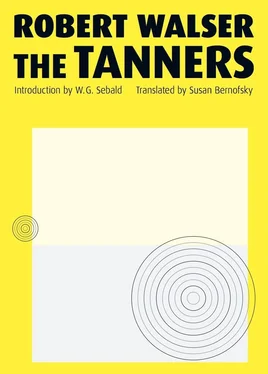Simon was noticing more and more that the Copyists Office was a small world all its own within the larger world. Envy and ambitions, hate and love, preferential treatment and honesty, vehement and modest natures manifested themselves here in microcosm, where only the pettiest advantages were at stake, just as clearly and unmistakably as anywhere people struggled to make a living. There were no sentiments or urges that could not find themselves actualized here, if only on a paltry scale. Glorious troves of knowledge, to be sure, were of little use in the Office. A bearer of such knowledge could put it to use here at most improvisatorially, it could boost his standing, but it wouldn’t help him to acquire a better suit. Several members of the copyists fraternity spoke and wrote three languages to perfection. They were put to work translating, but doing so didn’t earn them any more than the loutish address writers and manuscript copiers received — the Copyists Office did not allow any one individual to rise within its ranks, that would have contradicted its own goals and purpose. After all, the point of its existence was to permit the unemployed to eke out a meager existence, not to disburse high, outrageous salaries. A person had to consider himself fortunate to find work at all at eight in the morning. Often enough it happened that the administrator would say to a group of waiting men: “Terribly sorry. Unfortunately there’s nothing today. Come back at ten. Perhaps some jobs will have come in by then!” and then at ten: “You’d better try again tomorrow morning. Not too likely anything else will turn up today.” The ones thus rejected, a group that included Simon on more than one occasion, then walked slowly and gloomily, one after the other, back down the stairs and onto the street where they remained standing for a little while in a nice round group, as though feeling the need to reflect first for a moment, only then to disperse again in all directions, one after the other. It was no pleasure to go rambling about the city streets with no money in one’s pocket, each of them knew this and each one thought: “What will it be like when winter comes?”
Sometimes elegantly dressed people with dainty manners came to the Copyists Office to ask for work. To them the administrator was in the habit of saying: “It’s my impression that you’d be better suited to the hustle and bustle of worldly life than to the Copyists Office. Here a person must sit still all day long, bent over and diligently working if he wants to earn his pittance. I’m speaking to you openly in this way because I have a feeling this work would not in fact suit you. Nor do you appear to be suffering doleful, needy poverty. I, however, am charged with giving employment first and foremost to the poor, that is, to those whose clothes might well be hanging off them in tatters as proof of their squalor. You, on the other hand, look far too grand, it would be a sin to employ you here. My advice to you is to mingle with other elegant people. It seems you’ve failed to recognize the gloom of the Copyists Office if you come here wearing such a cheerful expression to ask for work, as though you were going to a ball. Here it is customary to make clumsy defiant bows, or, most commonly, none at all, but you bowed to me a moment ago like a perfect man of the world. That’s no good, I have no use for you, I have neither employment that might satisfy you nor a world in which you might fit. You will have no difficulty finding a position as a shop or hotel clerk, should you have other intentions than just seeking adventure in this city, as I am inclined to suspect. Here a young man will experience only discouragement, but no other sorts of adventure. A person who comes here knows why he has come. You appear most assuredly not to have known this. Your entire person is an affront to my workers, you’ll have to admit this if you cast so much as a single look about the room. Just look at me: I too have seen the world, I know every metropolis, and I too would not be sitting here if I were not compelled to do so. A person who comes here has already experienced misfortune and all manner of adversity. Those who come here are the good-for-nothings, beggars, rogues and shipwrecks: in a word, the unfortunate. Now I ask you: Are you such a one? No, and therefore I now ask that you depart at once from this establishment, which contains no air that you would be capable of breathing for long. I know the creatures who belong here! Know them better perhaps than suits me! And now farewell!”
And with a wave of his hand he would smilingly dismiss those people who had no business in the Copyists Office. The administrator possessed poise and education, and he enjoyed showing them off on occasion before such happenstance and maladroit visitors who came more out of curiosity than need.
Beside the Copyists Office flowed a quiet, green, deep and old canal, a former fortress moat and the connecting link between the lake and the flowing river which in this way was given lake water to take along with it on its journey to distant seas. In general this was the quietest part of town; there was something secluded and village-like about it. When the ones who were sent away now tramped back down the stairs, they liked to sit for a while upon the railing at the edge of this canal, which then looked as if a row of large, strange, foreign birds were perched there. There was something philosophical about this, and indeed, many a one gazed down into the green dead water world and pondered the unrelentingness of fate just as fruitlessly as a philosopher is wont to do sitting in his study. The canal had something about it that invited one to dream and reflect, and the unemployed had ample time for this.
At the same time, the Copyists Office was a job market for the mercantile trade. A gentleman or lady, for example, might walk into the Office, go into the administrator’s office and ask to have a man, that is, a temporary worker for his or her place of business. Then the administrator would appear in the doorframe, looking over his charges, and after considering for a while would call one man by name: The person in question had then found work for a short while, perhaps eight, one, two or fourteen days. It was always an envy-arousing event when someone was called by name, for everyone was eager to work on the outside, since the pay was then higher and the work more interesting. Besides which, such a man who found work with kindhearted employers would be given a nice snack mornings and evenings, which was by no means to be despised. And so there was always a certain competition for such positions and an ogling of the one selected. Many believed they were always unjustly overlooked, while others, on the other hand, thought it advantageous to court and flatter the administrator and his under-official to attain what they so yearned for. It was approximately like a pack of trained dogs leaping up to snatch at a sausage that was constantly being jerked out of reach on a string, each dog firmly convinced that the others had no business going after the sausage, though without, of course, being able to substantiate that belief. Here too one man would growl at another who’d succeeded in snatching the prize, much as in the greater spheres of trade, scholarship, art and diplomacy, where things aren’t done so very differently, just with more cunning, arrogance and culture.
Simon also worked a few times on the outside — as abbreviated in the copyists’ patois — but he didn’t have much luck at it. Once he was sent to the devil by his boss, a shifty, rather brutal real estate and property agent who nearly fancied himself God almighty, because he’d been reading the newspaper when he should have been writing; and another time he hurled his pen right in the face of his employer, a wholesale fruit and vegetable merchant, with the words: “Do it yourself!” The fruitseller’s wife had insisted on bossing Simon around; so he simply broke things off; for, as he saw it, this female was merely trying to hurt and humiliate him, which in the end he didn’t see any reason to put up with; at least that’s how he felt about it.
Читать дальше












